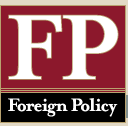Foreign Policy: Major Media Outlets Distorted, Not Unique on Syria

Local Editor
As the unrest in Syria continues, an unethical battle takes place in the media world.
"Foreign Policy" magazine stated that major channels and media outlets such as al-Jazeera and al-Arabiya have lowered their journalistic standards and relied on anonymous and false information.
The study shed light on some aspects of the media war in an analysis entitled "Breaking The Arab News."
According to the Analysis, "al- Arabiya and al-Jazeera, the two Gulf-based channels that dominate the Arabic news business, have moved to counter what it called Syrian regime propaganda, but have ended up distorting the news almost as badly as their opponents."
"In their bid to support the Syrian rebels' cause, these media giants have lowered their journalistic standards, abandoned rudimentary fact-checks, and relied on anonymous callers and unverified videos in place of solid reporting," the report said.
It further mentioned that the two channels "founded by members of the Qatari and Saudi royal families, respectively, and their coverage of Syria faithfully reflects the political positions of their backers."
"There's big money behind both stations: al-Jazeera was created with a $150 million grant from the emir of Qatar in 1996, and annual expenditure on the network's multiple channels reached nearly $650 million by 2010, according to market research firm Ipsos," the magazine revealed.
Similarly, al-Arabiya, which was launched in 2003 with an initial investment of $300 million by a group of Lebanese and Gulf investors led by Saudi businessman Waleed al-Ibrahim, the brother-in-law of the late Saudi King Fahd.
Hard numbers on the annual operating budgets of these channels aren't known, but they're likely to run into the hundreds of millions of dollars. The much smaller, U.S.-government financed al-Hurra, by way of comparison, costs around $90 million annually to run.
"Coverage of the Syrian uprising has drained these channels' resources," FP commented and noted that "Prime-time advertisements have been reduced or canceled altogether, thereby decreasing revenues. In place of carefully reported segments, some newscasts rely almost exclusively on citizen journalist "eyewitness" accounts and uploaded media footage readily found on YouTube.
Moreover, the magazine highlighted that "it is not uncommon to tune in to either channel and find that the first 20 minutes of a newscast consists of Syrian activists -- some with shady backgrounds -- based either outside or inside Syria reporting via Skype on events that took place hundreds or thousands of miles away. "
Here is an example the magazine provides: "Perhaps the low point of both channels' Syrian uprising coverage was when they gave a platform to extremist cleric Adnan al-Arour, who once said of Syria's Alawite minority that they shall be minced in meat grinders and have their flesh fed to the dogs for their support of President Bashar al-Assad."
Al-Arabiya referred to "the sheikh" as a "symbol of the revolution", while al- Jazeera introduced him as the "biggest nonviolent instigator against the Syrian regime."
"These Arabic-language stations have done their worst work when the political stakes of their coverage are the highest," the report said and noted that "the networks use the very real challenges of reporting from inside Syria as an excuse to avoid stories that challenge their preferred narrative," the analysis explained.
" Elsewhere, for instance, articles have raised questions about the credibility of the widely quoted Syrian Observatory for Human Rights, a London-based Syrian opposition outlet -- but al-Jazeera and al-Arabiya haven't touched the story," it argues.
 On al-Qaeda presence, the magazine clarified that "newspapers around the world have also focused on the presence of terrorist groups, including al Qaeda, among the anti-regime fighters -- but such a possibility is rarely, if ever, entertained on the main Arabic stations. "
On al-Qaeda presence, the magazine clarified that "newspapers around the world have also focused on the presence of terrorist groups, including al Qaeda, among the anti-regime fighters -- but such a possibility is rarely, if ever, entertained on the main Arabic stations. "
"Al Jazeera and al-Arabiya are not unique in compromising their journalistic standards in Syria," it added.
Moving to western media, the report mentioned that "organizations such as the Guardian were fooled by an author claiming to be a gay girl in Damascus -- and who turned out to be an American man living in Scotland."
"The BBC World News editor also criticized the sensationalism of initial reports of a massacre in the town of Houla, writing, "it's more important than ever that we report what we don't know, not merely what we do".
In parallel, the magazine estimated that "the real loss here is for al-Jazeera, a channel that was followed by tens of millions of Arab viewers last year at the height of the Arab uprisings and is today a shadow of its former self."
Criticism of al-Jazeera and al-Arabiya has increased along with its biased coverage." Fadi Salem, a Dubai-based Syrian researcher specializing in media, accused both channels of "pay[ing] handsome amounts of money to anonymous callers with information regarding Syria" and recycling YouTube videos as if they from different parts of the country. "Many opposition figures [who are inside Syria] but do not see eye to eye with Saudi or Qatari foreign policy on Syria are 'banned' on both channels," Salem told the magazine.
Source: FP, Edited by moqawama.org
As the unrest in Syria continues, an unethical battle takes place in the media world.
"Foreign Policy" magazine stated that major channels and media outlets such as al-Jazeera and al-Arabiya have lowered their journalistic standards and relied on anonymous and false information.
The study shed light on some aspects of the media war in an analysis entitled "Breaking The Arab News."
According to the Analysis, "al- Arabiya and al-Jazeera, the two Gulf-based channels that dominate the Arabic news business, have moved to counter what it called Syrian regime propaganda, but have ended up distorting the news almost as badly as their opponents."
| Foreign Policy: Major Media Outlets Distorted, Not Unique on Syria |
"In their bid to support the Syrian rebels' cause, these media giants have lowered their journalistic standards, abandoned rudimentary fact-checks, and relied on anonymous callers and unverified videos in place of solid reporting," the report said.
It further mentioned that the two channels "founded by members of the Qatari and Saudi royal families, respectively, and their coverage of Syria faithfully reflects the political positions of their backers."
"There's big money behind both stations: al-Jazeera was created with a $150 million grant from the emir of Qatar in 1996, and annual expenditure on the network's multiple channels reached nearly $650 million by 2010, according to market research firm Ipsos," the magazine revealed.
Similarly, al-Arabiya, which was launched in 2003 with an initial investment of $300 million by a group of Lebanese and Gulf investors led by Saudi businessman Waleed al-Ibrahim, the brother-in-law of the late Saudi King Fahd.
Hard numbers on the annual operating budgets of these channels aren't known, but they're likely to run into the hundreds of millions of dollars. The much smaller, U.S.-government financed al-Hurra, by way of comparison, costs around $90 million annually to run.
"Coverage of the Syrian uprising has drained these channels' resources," FP commented and noted that "Prime-time advertisements have been reduced or canceled altogether, thereby decreasing revenues. In place of carefully reported segments, some newscasts rely almost exclusively on citizen journalist "eyewitness" accounts and uploaded media footage readily found on YouTube.
Moreover, the magazine highlighted that "it is not uncommon to tune in to either channel and find that the first 20 minutes of a newscast consists of Syrian activists -- some with shady backgrounds -- based either outside or inside Syria reporting via Skype on events that took place hundreds or thousands of miles away. "
Here is an example the magazine provides: "Perhaps the low point of both channels' Syrian uprising coverage was when they gave a platform to extremist cleric Adnan al-Arour, who once said of Syria's Alawite minority that they shall be minced in meat grinders and have their flesh fed to the dogs for their support of President Bashar al-Assad."
Al-Arabiya referred to "the sheikh" as a "symbol of the revolution", while al- Jazeera introduced him as the "biggest nonviolent instigator against the Syrian regime."
"These Arabic-language stations have done their worst work when the political stakes of their coverage are the highest," the report said and noted that "the networks use the very real challenges of reporting from inside Syria as an excuse to avoid stories that challenge their preferred narrative," the analysis explained.
" Elsewhere, for instance, articles have raised questions about the credibility of the widely quoted Syrian Observatory for Human Rights, a London-based Syrian opposition outlet -- but al-Jazeera and al-Arabiya haven't touched the story," it argues.
 On al-Qaeda presence, the magazine clarified that "newspapers around the world have also focused on the presence of terrorist groups, including al Qaeda, among the anti-regime fighters -- but such a possibility is rarely, if ever, entertained on the main Arabic stations. "
On al-Qaeda presence, the magazine clarified that "newspapers around the world have also focused on the presence of terrorist groups, including al Qaeda, among the anti-regime fighters -- but such a possibility is rarely, if ever, entertained on the main Arabic stations. ""Al Jazeera and al-Arabiya are not unique in compromising their journalistic standards in Syria," it added.
Moving to western media, the report mentioned that "organizations such as the Guardian were fooled by an author claiming to be a gay girl in Damascus -- and who turned out to be an American man living in Scotland."
"The BBC World News editor also criticized the sensationalism of initial reports of a massacre in the town of Houla, writing, "it's more important than ever that we report what we don't know, not merely what we do".
In parallel, the magazine estimated that "the real loss here is for al-Jazeera, a channel that was followed by tens of millions of Arab viewers last year at the height of the Arab uprisings and is today a shadow of its former self."
Criticism of al-Jazeera and al-Arabiya has increased along with its biased coverage." Fadi Salem, a Dubai-based Syrian researcher specializing in media, accused both channels of "pay[ing] handsome amounts of money to anonymous callers with information regarding Syria" and recycling YouTube videos as if they from different parts of the country. "Many opposition figures [who are inside Syria] but do not see eye to eye with Saudi or Qatari foreign policy on Syria are 'banned' on both channels," Salem told the magazine.
Source: FP, Edited by moqawama.org




